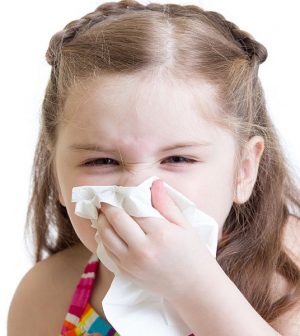- Could Your Grocery Store Meat Be Causing Recurring UTIs?
- Are You Making This Expensive Thermostat Error This Winter?
- Recognizing the Signs of Hypothyroidism
- 10 Strategies to Overcome Insomnia
- Could Artificial Sweeteners Be Aging the Brain Faster?
- Techniques for Soothing Your Nervous System
- Does the Water in Your House Smell Funny? Here’s Why
- Can a Daily Dose of Apple Cider Vinegar Actually Aid Weight Loss?
- 6 Health Beverages That Can Actually Spike Your Blood Sugar
- Treatment Options for Social Anxiety Disorder
Get Ready for Summer Camp — and Allergies

It may still be winter, but it’s never too early to plan for your kids’ summer camp.
And now’s the time to think about preparing them to handle allergies and allergic reactions, according to experts at the American College of Allergy, Asthma and Immunology (ACAAI).
“Kids who suffer from seasonal allergies, food allergies or asthma also wonder about their health. For them, additional preparation is necessary to keep them safe and happy, so they can enjoy their time away from home,” ACAAI president Todd Mahr, said in a college news release.
The ACAAI has five tips to help make the summer camp experience a great one.
- If your child suffers from asthma or food allergies, consider sending him or her to a camp that specializes in these conditions. Specialty camps can have trained staff who know how to treat asthma and allergies. You can search the internet for camps that focus on your child’s needs.
- Before sending your child off to camp, consult with your allergist and make sure prescriptions are up-to-date and your child has everything needed to treat their allergies or asthma. The allergist can also provide a plan to share with the camp.
- Be sure the camp’s staff is prepped on your child’s allergies and asthma. They should know if asthma makes some activities difficult. Be sure the medical staff knows about your child’s medications and ask how they deal with emergencies. Also know where the nearest hospital is and how quickly they can get your child there.
- Warn your child not to touch plants that can cause an allergic reaction, like poison ivy, poison oak or poison sumac. The rash from these plants is very uncomfortable. Calamine lotion can help, but an allergic child may need a trip to the camp medical team.
- If your child has food allergies, they need to advocate for themselves and watch closely for allergens. Be sure your child always carries an epinephrine auto injector and a spare. Talk with the kitchen staff about how they handle cross-contamination and let counselors and medical staff know the foods your child is allergic to. Your child should also make sure friends know about the allergies and are able to help.
More information
For more on allergies and asthma, visit the Asthma and Allergy Foundation of America.
Source: HealthDay
Copyright © 2026 HealthDay. All rights reserved.










